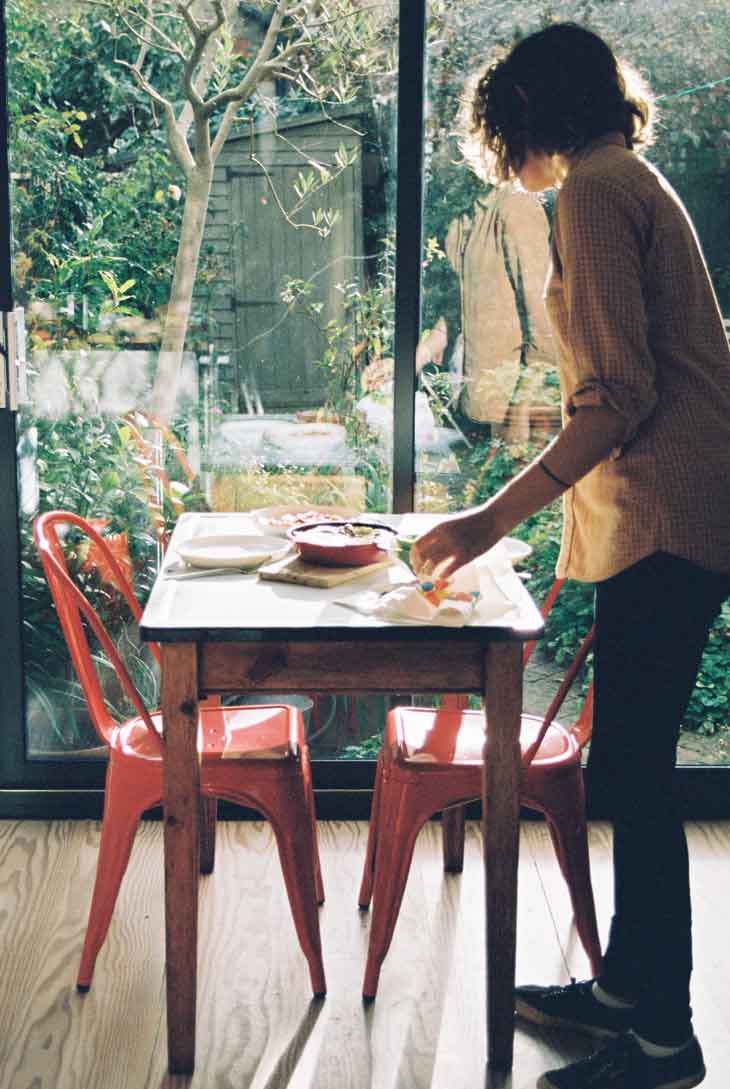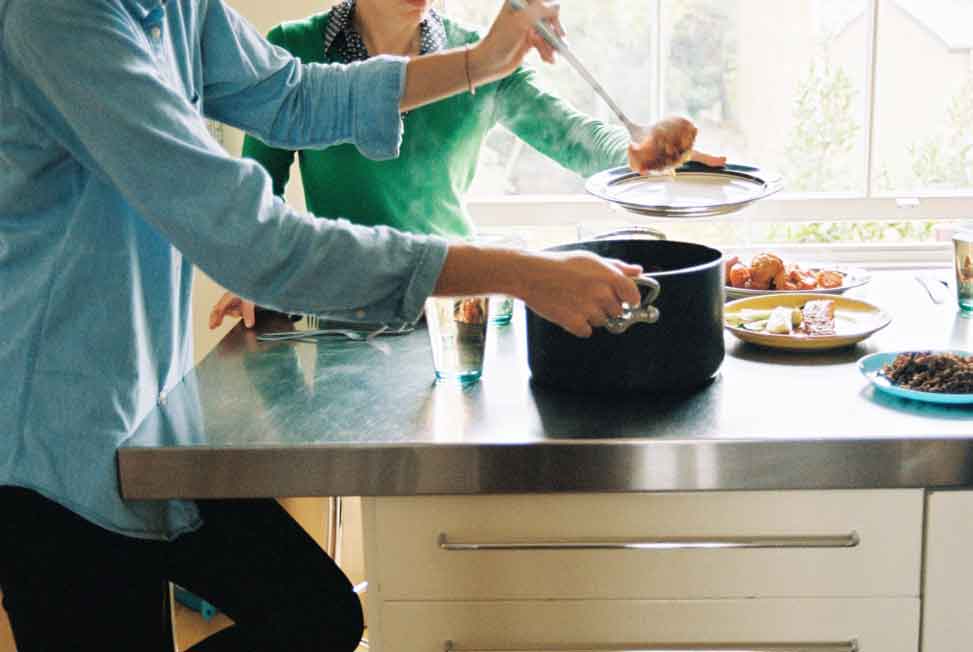
Ruby Tandoh
by Sofia Niazi
Ruby Tandoh is an Essex girl, baker and food writer living in Sheffield. She talks to OOMK about her second cookbook Flavour and what it means to challenge ‘clean-eating’ in a publishing landscape dominated by health-conscious cookery.
Can you describe your kitchen to us?
My girlfriend and I moved recently and now we're renting an actual house with a little shared garden and a big kitchen and space for flowerpots outside... it's perfect. In loads of the places I've lived before, I was cooking in windowless little mouse-infested kitchens, lit by the dim glow of a single yellow bulb. This place isn't fancy, but it feels homely and wholesome and just right. I love it.
The introduction to Flavour, your latest cookbook, is a great manifesto for an unapologetic ‘return to flavour’ in an age obsessed with arbitrary wellness. Why was it important for you to address the ‘wellness’ trend head on and place your cookbook within this conversation?
Over the years I've suffered on-and-off from eating disorders, so when I see the kind of judgemental, moralistic language that wellness uses, all I can think of is how damaging it is for people who are struggling to make peace with the food they eat. I take umbrage at the huge part of the food press that is hell bent on categorising certain foods as 'clean' or 'dirty', or 'good' and 'bad'. That type of thinking is fundamentally at odds with what a healthy, happy relationship with food looks like. At the moment, there is this sense of food as an issue of personal morality, like health is a moral imperative devoid of any socio-political factors.
We’re in a climate where both food banks are struggling to assist families slipping below the poverty line and pricey object-like artisanal cookbooks are experiencing a mainstream moment. Flavour is interspersed with explicit reassurances to buy whatever is available and affordable, regardless of whether it’s organic. How conscious were you of addressing class through your choice of recipes and ingredients?
Food seems to be becoming more and more splintered at the moment, diverging into expensive coffee table cookbooks and artisan foods versus, at the other end of the spectrum, an increasing reliance on food banks and endemic food poverty. In the wake of cuts to welfare, the scaling back of free school meals and taxing of 'junk' food is devastating. With all of that in mind, I was sure that I didn't want my cookbook to be just another expensive relic of an elitist food world. I wanted to make sure that there were things in there that any family could make and enjoy, no matter their budget. I took a lot of inspiration from my parents' cooking when I was writing it, adapting the big one-pot recipes that they used to feed our family on a tight budget, and making them my own.

It’s interesting how a cookbook, as a text, can act as a social commentary, historical document or personal memoir. Where do you see Flavour in relation to your other food writing?
There were definitely a lot more personal and political elements in Flavour than in my first book, Crumb. When I started out with Crumb, I was brand new in the food world and all I, quite naively, wanted to do was to talk about food and flavours and the joy of being in the kitchen. As I understood more of the food industry around me - with all its self-serving trendsetting, appropriation and fatphobia - the less I was happy to be complicit in that. So Flavour is a push back against that in a small way. I threaded references to pop culture and my favourite queer icons into the text, I let my own personal narrative factor into the recipes I wrote and I tried to infuse the whole thing with a food-positive, body-positive ethos. It was a way of creating a niche for myself that celebrated self-care and inclusivity and thoughtfulness in food. In a lot of more serious, academic food writing, I think that personal context is lacking, which leaves it rather cold.
You've gained an online reputation for being ‘outspoken’ for criticising the industry. Was there ever pressure to conform to a more shiny, professional persona?
For sure! At the start of my food writing days there were brands that were like 'Bake this for us! Help with this promoted tweet!' and loads of opportunities like that, but the more I've sworn and raged on social media, the fewer of those offers I've had. I know it seems like I'm on a mission to burn all my bridges, but to be honest this is just me protecting myself, my culture and my queerness in the face of a b o r i n g, often oppressive, white food media. I'm not comfortable standing by while Rick Stein bulldozes around Ghana or wherever, showing my relatives how to make jollof rice. I'm not going to go easy on the Hemsley sisters while they peddle their lucrative, fatphobia wellness agenda. It's funny though, because from all the arguing on social media you'd think that I was really brash and self-assured IRL, but the reality is that I'm the quietest, meekest, least assertive person in the world. I guess we all find different outlets for fury.
Tell us something about putting a recipe book together that other people might not know…
You think that you're going to be eating like a queen while you write it, but oh my god - I've never eaten worse than when I've been writing my cookbooks. There's something about the rigour of it, of having to hone all these measurements and timings and serving sizes... the stress just ruins the food for you. All that precision and testing somehow strips away the magic. I end up grazing all day, but barely eating a full meal. It's weird how overexposure can do that to you, even overexposure to something that you ordinarily really love. There's still a lot of joy in the process though; I still remember the surprise and joy of perfecting this one recipe - a spicy red lentil soup with lemongrass and ginger - that I'd spent so long trying to get right. I burnt my tongue as I sipped it from a teaspoon but I've never been so happy.
I love how Kelis took a long and confident hiatus from making music to join Le Cordon Bleu and is now a brilliant saucier (because condiments are important to me). Who are your personal food heroes and why?
I love Kelis too! My absolute queen. At the moment, I love the guys behind the Groundnut Cookbook (and the supper club by the same name) - their food is perfect, and it was actually one of my first explorations into my culinary roots. They make a lot of West African food, and their groundnut soup was something I really savoured after my grandad died. I felt close to him when I ate that. I'm also going through a really intense Nora Ephron phase right now. The way that she talks about food so candidly is beautiful.
What will you be working on next?
I just finished writing a book actually-it's called Eat Up! and it's all about food, culture, appetite and art, and how all those things come together on the plate. It's about everything from the power of fast food, to the politics of prison food, to the flavours we learn to love before we've even left the womb. I just think food touches every area of life- it's much bigger than what goes on in the kitchen. I wanted to capture that. The book is out in February!
Images by Charlotte Brand
